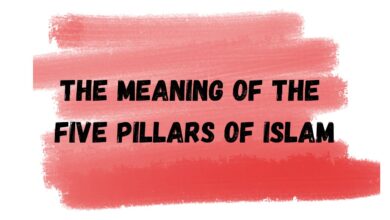

Introduction
The Quran, the holy scripture of Islam, plays a pivotal role in shaping the beliefs and practices of over 1.8 billion Muslims worldwide. One of the distinguishing features of the Quran is its approach towards other monotheistic religions, including Christianity. For Muslims, the Quran represents the final and complete revelation, confirming and rectifying the messages conveyed in previous scriptures. This article aims to explore what the Quran says about Christianity, emphasizing the commonalities and shared values between the two faiths.
Acknowledging Jesus in the Quran
Central to the Quranic perspective on Christianity is the veneration of Jesus Christ. Islam reveres Jesus as one of the greatest prophets and messengers sent by God, referred to as ‘Isa in Arabic. The Quran recognizes Jesus’ miraculous birth to the Virgin Mary (Maryam), emphasizing his extraordinary status as a prophet who performed remarkable miracles by God’s will.
Jesus is referred to in various verses, emphasizing his role as a spiritual guide and a bearer of divine wisdom. For example, in Surah Al Imran (3:45-52), the Quran recounts the angelic announcement of Jesus’ birth, his miraculous abilities, and his call to monotheism. It is crucial to recognize that Islam’s acceptance of Jesus as a prophet strengthens the interfaith dialogue between Muslims and Christians.
On the Trinity
The Quran addresses the Christian concept of the Trinity, wherein God is believed to be a triune being comprising the Father, Son (Jesus), and the Holy Spirit. Islam, being a staunch monotheistic faith, challenges the concept of the Trinity. In Surah An-Nisa (4:171), the Quran states:
“O People of the Scripture, do not commit excess in your religion or say about Allah except the truth. The Messiah, Jesus, the son of Mary, was but a messenger of Allah and His word which He directed to Mary and a soul [created at a command] from Him. So believe in Allah and His messengers. And do not say, ‘Three’; desist – it is better for you. Indeed, Allah is but one God. Exalted is He above having a son.”
This verse affirms the Islamic belief in the absolute oneness of God, rejecting the idea of a divine trinity. However, it is essential to note that Islamic teachings emphasize the need for respectful discussions and debates while maintaining mutual understanding and tolerance.
Humanity and Compassion in Christianity and Islam
The Quran, like the Bible, teaches followers to be compassionate, just, and benevolent to their fellow human beings. In Surah Al-Ma’idah (5:82), the Quran praises the close bond between Muslims and Christians, acknowledging that many Christians are devoted believers with sincere hearts.
The Quran encourages dialogue and cooperation with the followers of other faiths, including Christians, in promoting peace, social justice, and the well-being of humanity. Both Christianity and Islam share numerous ethical and moral teachings, such as feeding the hungry, caring for the needy, and treating others with kindness and respect.
Respect for Scriptures and Prophets
The Quran acknowledges the divine origin of previous scriptures, including the Bible, and the significance of the prophets mentioned therein. Muslims are instructed to respect the Christian scriptures, albeit with the understanding that the Quran supersedes all previous revelations. In Surah Al-Baqarah (2:136), the Quran states:
“Say, [O believers], ‘We have believed in Allah and what has been revealed to us and what has been revealed to Abraham and Ishmael and Isaac and Jacob and the Descendants and what was given to Moses and Jesus and what was given to the prophets from their Lord. We make no distinction between any of them, and we are Muslims [submitting] to Him.'”
This verse underscores the Islamic belief in the continuity of divine revelation and respect for the prophetic traditions shared by Judaism, Christianity, and Islam.
Conclusion
In conclusion, the Quran recognizes the importance of Christianity and its central figure, Jesus Christ. Islam holds Jesus in high esteem as a prophet and messenger of God, sharing many common ethical teachings with Christianity. While the Quran does challenge certain Christian theological concepts, it encourages respectful dialogue and peaceful coexistence between the two faiths.
In today’s diverse and interconnected world, interfaith understanding and cooperation are of utmost importance. By recognizing the shared values between Islam and Christianity as conveyed in the Quran, followers of both religions can foster greater mutual respect and work together to address global challenges and promote peace and harmony.
What does the Quran say about Christianity ?
Yes, the Quran acknowledges Christianity as one of the major monotheistic religions and recognizes the followers of Jesus Christ as “People of the Book.”
What does the Quran say about Jesus?
The Quran holds Jesus (known as ‘Isa in Arabic) in high regard as a prophet and messenger of God. It affirms his miraculous birth to the Virgin Mary, his wisdom, and the miracles he performed by God’s will
Does the Quran accept the Christian concept of the Trinity?
No, the Quran challenges the concept of the Trinity, which is the belief in God as a triune being consisting of the Father, Son (Jesus), and the Holy Spirit. Islam firmly asserts the oneness of God and rejects the idea of a divine Trinity.
Are there any shared values between Christianity and Islam in the Quran?
Yes, the Quran encourages believers to treat Christians with respect and kindness. It acknowledges shared ethical teachings, such as compassion, charity, and justice, fostering a basis for interfaith understanding.
Does the Quran respect the Christian scriptures?
Yes, the Quran recognizes the divine origin of previous scriptures, including the Bible, and the significance of the prophets mentioned therein, including Jesus. Muslims are instructed to respect these scriptures while adhering to the Quran as the final revelation.
Does the Quran promote dialogue between Muslims and Christians?
Absolutely, the Quran encourages respectful dialogue and cooperation with people of other faiths, including Christians. Muslims are urged to engage in peaceful discussions and work together to promote harmony and address common concerns.
Does the Quran promote dialogue between Muslims and Christians?
Absolutely, the Quran encourages respectful dialogue and cooperation with people of other faiths, including Christians. Muslims are urged to engage in peaceful discussions and work together to promote harmony and address common concerns.
Does the Quran call for peaceful coexistence with Christians?
Yes, the Quran promotes peaceful coexistence with all people, including Christians. It advocates mutual respect, understanding, and the elimination of hostility between believers of different faiths.
How does the Quran view Christians?
The Quran acknowledges Christians as monotheistic believers and refers to them as “People of the Book,” recognizing their devotion and faith in the Almighty.
Are there any differences between the Islamic and Christian perspectives on Jesus in the Quran?
While both Islam and Christianity regard Jesus as significant, there are theological differences in their understanding of his divinity and role. Islam considers Jesus as a revered prophet, while Christianity views him as the Son of God and part of the Holy Trinity.
How can Muslims and Christians find common ground through the Quranic teachings?
By focusing on shared ethical principles, such as compassion, justice, and benevolence towards humanity, Muslims and Christians can build bridges of understanding and cooperation, fostering mutual respect and harmonious coexistence.





